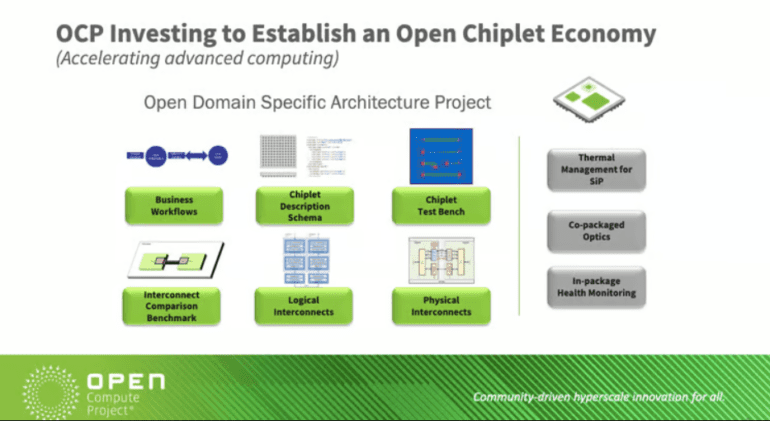TL;DR:
- OCP partners with JEDEC to set global standards for chiplets, fostering modular silicon innovation.
- CDXML specification simplifies chiplet descriptions, streamlining integration into 3D circuits.
- Collaboration with UEC targets Ethernet optimization for AI and HPC workloads.
- OCP aims to bolster data center hardware and firmware security with the SAFE program.
Main AI News:
In the realm of data center innovation, the Open Compute Project (OCP) remains resolute in its mission to propel open specifications to the forefront. At the OCP Summit event, a slew of pivotal announcements reverberated through the industry, signaling OCP’s unwavering commitment to shaping the future of data centers.
One of the standout developments is OCP’s strategic collaboration with the JEDEC Alliance, aimed at ushering chiplet technology into mainstream data center operations. Chiplets, the burgeoning paradigm in silicon chip design, depart from the conventional system-on-a-chip approach, offering smaller, modular units of silicon.
The crux of this partnership revolves around the establishment of global standards for novel device components like chiplets, effectively mitigating fragmentation and redundant endeavors. OCP has proactively introduced the Chiplet Description Schema (CDXML) specification, facilitating standardized chiplet descriptions. This empowers chiplet manufacturers to furnish clients with comprehensive electronic descriptions. CDXML will seamlessly integrate into the JEDEC JEP30 standard.
CDXML, a reservoir of standardized chiplet descriptors encompassing thermal, physical, behavioral, power, electrical, test, and security attributes, catalyzes automated system-in-package (SiP) design workflows. It harmonizes the integration of multichiplets into stacked and 3D integrated circuits.
Cliff Grossner, Chief Innovation Officer at OCP, underscored the organization’s commitment to ongoing initiatives with JEDEC and other standards bodies. Their collective focus is to define part descriptions and other essential elements to enhance chiplet production.
As the data landscape evolves, OCP is directing its gaze toward the burgeoning demands of artificial intelligence (AI). This is exemplified by OCP’s collaboration with the Ultra Ethernet Consortium (UEC), a partnership forged with the intention of optimizing Ethernet infrastructure for AI and high-performance computing (HPC) workloads.
The alliance unites UEC’s expertise in modernizing Ethernet to suit specialized workloads with OCP’s proficiency in specifying comprehensive system solutions and emerging technologies. Their shared goals encompass elevating Ethernet performance to tackle issues of scale, bandwidth, multipathing, and congestion in the context of AI and HPC workloads. The concerted efforts aim to expedite the integration of UEC-inspired Ethernet enhancements into complete systems, thereby enhancing OCP’s multivendor supply chain.
“We’ve been diligently crafting sustainable large-scale computational infrastructure for an extended period,” remarked Cliff Grossner. “Fine-tuning it for AI is a natural progression of our mission.”
In the pursuit of fortifying data center integrity, OCP unveils a groundbreaking security program dubbed SAFE (Security Appraisal Framework and Enablement). This initiative is geared towards enhancing the security of data center hardware and firmware.
SAFE introduces an open-source, standardized audit checklist and criteria for engaging third-party auditors in reviewing device firmware. Device vendors can enlist the services of OCP-approved auditors, known as security review providers, to evaluate their firmware using this checklist. The overarching objective is to streamline the process, minimize costs, and eliminate redundancy associated with device security reviews. Simultaneously, it extends assurance to customers regarding firmware updates.
Steve Helvie, VP of Emerging Markets at OCP, expressed the organization’s long-held aspiration to offer security compliance services. He emphasized that SAFE is a significant stride towards addressing hardware and firmware security within the data center, signifying OCP’s foray into a new dimension of the industry.
Conclusion:
OCP’s strategic collaborations and initiatives signal a pivotal shift in the data center market. By setting global standards for chiplets and optimizing Ethernet for AI, they are poised to meet the evolving demands of modern computing. Additionally, their focus on enhancing hardware and firmware security underscores the industry’s growing need for robust data center integrity measures. OCP’s proactive stance positions them as a key player in shaping the future of data center technology.

